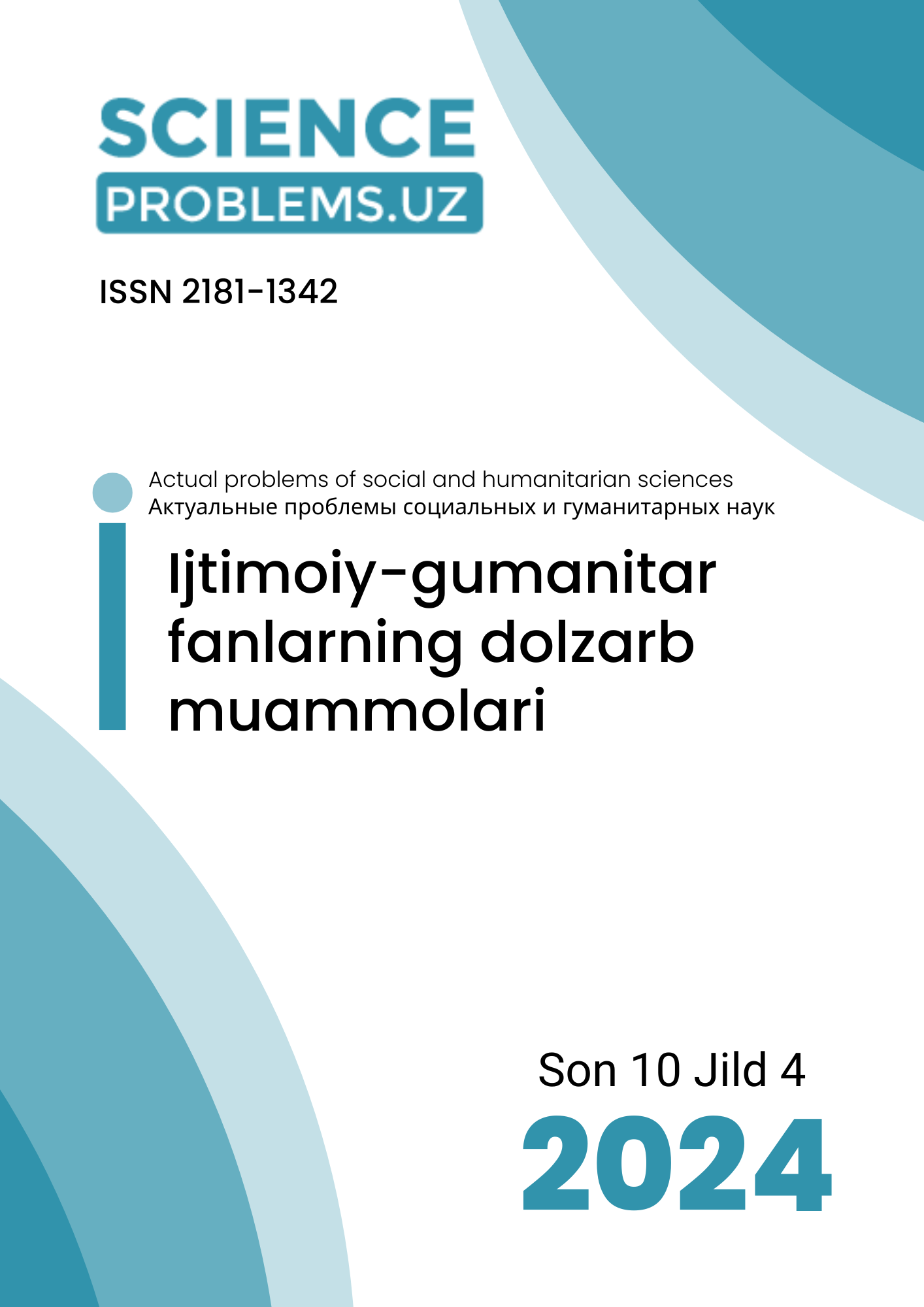NUMBER AS THE ESSENCE OF THINGS: PYTHAGOREAN PHILOSOPHY
Kalit so'zlar
https://doi.org/10.47390/SPR1342V4I10Y2024N22Kalit so'zlar
monad, duad, Pythagorean philosophy, concept of imitation, doctrine of Pythagoreanism, Pythagorean table of categories, Hegel.Annotasiya
The article discusses how Pythagorean philosophy evolved from seeing numbers as the basis of everything to understanding them as essential principles shaping the universe. It emphasizes the practical and philosophical significance of numbers, exploring their role in various fields like math, science, and ethics. Pythagoreans viewed numbers not just as tools for counting but as fundamental aspects of existence itself. They focused on two key principles: unity (monad) and duality (duad), seeing them as foundational concepts in understanding both numbers and reality[23]. The text also compares Pythagorean ideas with those of later philosophers like Plato, Iamblichus and others. Overall, it explores the profound implications of seeing the world through the lens of numbers.
Manbalar
1. Almut-Barbara Renger and Alessandro Stavru “Pythagorean Knowledge from the Ancient to the Modern World: Askesis, Religion, Science”- Otto Harrassowitz GmbH & Co. KG, Wiesbaden- 2016, 593 P
2. Hardy G.H.and Wright E. M. Introduction to the Theory of Numbers (6th edition), Oxford University Press, New York, 2006- P.234
3. Hegel’s Philosophy of Mind. Being Part Three of the Encyclopaedia of the Philosophical Sciences (1830), trans. W. Wallace, together with the Zusätze in Boumann’s text (1845), trans. A.V. Miller, Oxford: Clarendon Press, 1971- P.293
4. Owen Goldin. The Pythagorean Table of Opposites, Symbolic Classification, and Aristotle. Philosophy Department, Marquette University, Milwaukee, W. Science in Context, Vol. 28, No. 2. June 2015- PP. 171-193.
5. Sadullayeva M.A. Digital culture as a humanitarian phenomenon. // EPRA International Journal of Research and Development (IJRD). -Volume: 5 | Issue: 10 | October, 2020. – PP.231-235. (09.00.00; №12; 14. Indexed by Index Copernicus; Researchbib)
6.Sadullayeva M.A. Falsafada ramzning gnoseologik tahlili. // International journal of education, Social science and humanities. - Finland, 2024. – Volume 12. Issue 1. – PP.186-197. (09.00.00; №. Indexed by Researchbib)
7.Sadullayeva M.A. Philosophy of numbers in Eastern and Sufi literature. // Imom Buxoriy saboqlari. – Samarqand, 2023. - №1. – B.109-112. (09.00.00; №9)
8. Sadullayeva M.A. Number as the essence of things: philosophy of Western and central Asian scientists. // Imom Buxoriy saboqlari. – Samarqand, 2024. - №1. – B.48-51. (09.00.00; №9)
9. Sadullayeva M.A. Symbolic significance of numbers in Eastern Classic literature. // Мировая наука. - №6 (27), 2019. – C.15-20.
10. Sadullayeva M.A. Symbolic language of numbers in Muslim architecture. // ACADEMICIA. An international multidisciplinary research journal. -Vol 10. Issue 5, May 2020. -PP.869-875
11. Sadullayeva M.A. Philosophy of Numerical Symbolism in World’s Cultures. // International journal of trend in scientific research and development. - Volume 4, Issue 5. - July-August, 2020. -PP.1545-1548
12. Sadullayeva M.A. Philosophical foundation of digitalization and digital transformation of communication. // Xorazm Ma’mun akademiyasi axboroti. -Xiva, 2024. - № 2/3. – B.21-23.
13. Sadullayeva M.A. Symbolic significance of numbers in eastern literature and mysticism. // «Science and Education in the Modern World: Challenges of the XXI Century». Материалы V Международной научно-практической конференции. - Нур-Султан, 2019. -С.9-12
14. Sadullayeva M.A. Spiritual and philosophical significance of numbers. // “XXI asr ilm-fani va taʼlim sohasida ayollar: yutuqlar va muammolar” mavzusidagi Respublika ilmiy-amaliy anjumani materiallari. 16-fevral 2023 yil. – Navoiy, 2023. – B.55-57.
15. Silvano Leonessi, adapted by Mary Jones, S.R.C. The Pythagorean Philosophy of Numbers. Rosa+Croce, No. 30 (Winter 2007), 30-33; first Englishlanguage translation in Rosicrucian Beacon, 18:2 (March 2009), PP.13-16.
16. Waterfield, R. (transl.) The Theology of Arithmetic. On the Mystical, Mathematical and Cosmological Symbolism of the First Ten Numbers, Michigan. 2012.- P.456
17. Афонасин Е., Афонасина А., Щетников А. Пифагорейская традиция : [пер. и материалы]. СПб. : Рус. Христ. гуманит. акад. : Пальмира. 2017- C 342
18. Гатри У.К. История греческой философии. В 6 т. Т. 1. Ранние досократи-ки и пифагорейцы. СПб. : Владимир Даль.2015- C. 458
19. Гегель Г. В. Лекции по истории философии. С-Пб, 1994 - С.232
21. Жмудь Л.Я. Пифагор и ранние пифагорейцы. М. : Рус. Фонд содействия образованию. 2012- C 332.
21. Лебедев А.В. Фрагменты ранних греческих философов. Ч. 1. От эпических теокосмогоний до возникновения атомистики / изд. подгот. А.В. Лебедев. М. : “Наука”. 1989 – C.276
22. Подопригора А. Число и цифра: Птрадиция и метафизика цифровой реалъности. Науч. ежегодник Института философии и права Урал. отд-ния Рос. акад. наук, 2018, вол. 18, исс. 3, СС. 7-26
23. Sobirovich, T. B. (2024). Renewal of Societal Ideosphere: An Analytical Study of Medieval Philosophical Thought. Philosophy, 8(3), 12-18.
24. Sobirovich, T. B. (2024). Socio-Philosophical Analysis Of Society’s Ideosphere. Indonesian Journal of Social Development, 2(1).








